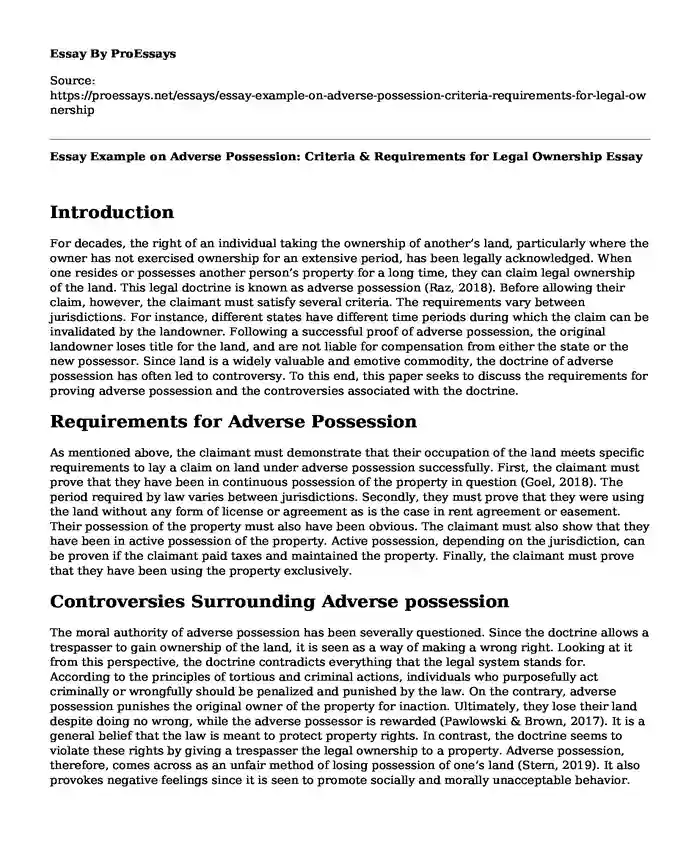Introduction
For decades, the right of an individual taking the ownership of another’s land, particularly where the owner has not exercised ownership for an extensive period, has been legally acknowledged. When one resides or possesses another person’s property for a long time, they can claim legal ownership of the land. This legal doctrine is known as adverse possession (Raz, 2018). Before allowing their claim, however, the claimant must satisfy several criteria. The requirements vary between jurisdictions. For instance, different states have different time periods during which the claim can be invalidated by the landowner. Following a successful proof of adverse possession, the original landowner loses title for the land, and are not liable for compensation from either the state or the new possessor. Since land is a widely valuable and emotive commodity, the doctrine of adverse possession has often led to controversy. To this end, this paper seeks to discuss the requirements for proving adverse possession and the controversies associated with the doctrine.
Requirements for Adverse Possession
As mentioned above, the claimant must demonstrate that their occupation of the land meets specific requirements to lay a claim on land under adverse possession successfully. First, the claimant must prove that they have been in continuous possession of the property in question (Goel, 2018). The period required by law varies between jurisdictions. Secondly, they must prove that they were using the land without any form of license or agreement as is the case in rent agreement or easement. Their possession of the property must also have been obvious. The claimant must also show that they have been in active possession of the property. Active possession, depending on the jurisdiction, can be proven if the claimant paid taxes and maintained the property. Finally, the claimant must prove that they have been using the property exclusively.
Controversies Surrounding Adverse possession
The moral authority of adverse possession has been severally questioned. Since the doctrine allows a trespasser to gain ownership of the land, it is seen as a way of making a wrong right. Looking at it from this perspective, the doctrine contradicts everything that the legal system stands for. According to the principles of tortious and criminal actions, individuals who purposefully act criminally or wrongfully should be penalized and punished by the law. On the contrary, adverse possession punishes the original owner of the property for inaction. Ultimately, they lose their land despite doing no wrong, while the adverse possessor is rewarded (Pawlowski & Brown, 2017). It is a general belief that the law is meant to protect property rights. In contrast, the doctrine seems to violate these rights by giving a trespasser the legal ownership to a property. Adverse possession, therefore, comes across as an unfair method of losing possession of one’s land (Stern, 2019). It also provokes negative feelings since it is seen to promote socially and morally unacceptable behavior.
However, regardless of the moral questions that have been raised regarding the doctrine, various arguments have been made in its favor. Since land is an exceedingly valuable commodity, as mentioned earlier, it should be utilized. The doctrine, therefore, encourages negligent landowners to make use of their property (Lovett, 2017). The doctrine also helps in the validation of disputed land titles and is part of the statute of limitations that protects individuals against unfounded claims.
Conclusion
As seen in the paper, adverse possession is a legal doctrine that allows an individual who has resided in a particular property for a long time to claim its ownership. As shown, the claimant must fulfil certain requirements for a successful claim. While the doctrine promotes the utilization of property by landowners and helps in the validation of disputed land titles, it is controversial. Prominently, it seems to be violating property rights, as well as the principals of criminal and tortious law, by awarding the trespasser and punishing the original landowner.
References
Goel, S. (2018). Doctrine of Adverse Possession: Article 65 of the Limitation Act, 1963. Retrieved from https://papers.ssrn.com/sol3/papers.cfm?abstract_id=3298121
Lovett, J. (2017). Disseisin, Doubt, and Debate: Adverse Possession Scholarship in the United States (1881-1986). Tex. A&M L. Rev., 5, 1. Retrieved from https://heinonline.org/hol-cgi-bin/get_pdf.cgi?handle=hein.journals/twlram2017§ion=5
Pawlowski, M., & Brown, J. (2017). Adverse possession and the transmissibility of possessory rights–The dark side of land registration? Conveyancer and Property Lawyer, 2, 116-131. Retrieved from http://gala.gre.ac.uk/id/eprint/16493/
Raz, I. T. (2018). Use It or Lose It: Adverse Possession and Economic Development. Journal of Economic History, 78(2), 622. Retrieved from http://www.eh.net/eha/wp-content/uploads/2017/08/Raz.pdf
Stern, S. (2019). David Against Goliath: The Distributive Justification for the Adverse Possession Doctrine. New Perspectives on Acquisitive Prescription (Bjorn Hoops and Ernst Marais eds. 2019). Retrieved from https://papers.ssrn.com/sol3/papers.cfm?abstract_id=3447130
Cite this page
Essay Example on Adverse Possession: Criteria & Requirements for Legal Ownership. (2023, Sep 10). Retrieved from https://proessays.net/essays/essay-example-on-adverse-possession-criteria-requirements-for-legal-ownership
If you are the original author of this essay and no longer wish to have it published on the ProEssays website, please click below to request its removal:
- Types of Threats Posed to the United States - Case Study Example
- Examining the Relationship between Veterans, Substance Use, and Crime: Research Proposal
- Annotated Bibliography: Gun Control
- Essay Sample on International Law and Human Rights
- Baltimore: Poverty, Drug Markets, & CCP to Restore Good - Essay Sample
- Essay Example on Correctional System: Management, Handling & Psychology
- Texas Death Penalty Flawed: The Case of Willingham - Essay Sample







